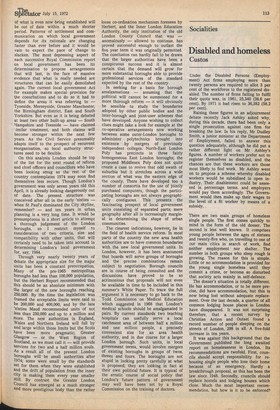Socialities
Disabled and homeless custos
Under the Disabled Persons (Employment) Act firms employing more than twenty persons are required to allot 3 per cent of the workforce to the registered disabled. The number of firms failing to fulfil their quota was, in 1961, 25,340 (38.6 per cent). By 1971 it had risen to 36,382 (58.2 per cent).
Raising these figures in an adjournment debate recently Jack Ashley asked why, during this decade, there had been only a single prosecution against one firm for breaking the law. In his reply, Mr Dudley Smith, a junior minister at the Department of Employment, failed to answer this question adequately, although he did put a rather different light on Mr Ashley's figures. A number of workers prefer not to register themselves as disabled, and the chances are that these workers are those most likely to find work. Mr Ashley went on to propose a scheme whereby disabled workers would be subsidised in open industry. Their disablement could be assessed in percentage terms. and employers would pay them accordingly. The Government would then make up their wages to the level of a fit worker by means of a subsidy. • There are two main groups of homeless single people. The first comes quickly to mind in the form of the old dosser. The second is less well known. It comprises young people between the ages of sixteen and twenty-five who, on travelling to one of our main cities in search of work, find neither employment nor shelter. The number in both groups who sleep rough is growing. The reason for this is simple. Little or no accommodation is provided for the young single homeless until they commit a crime, or become so disturbed that soeiety acts mainly in self-defence.
The dosser's situation is totally different. He has accommodation, or to be more precise, did have accommodation, but this is now being lost without adequate replacement. Over the last decade, a quarter of all common lodging house places in London have disappeared. It was not surprising therefore, that a recent survey by Christian Action and Outset found a record number of people sleeping on the streets of London, 298 in all. A five-fold increase in ten years.
It was against this background that the Government published the long awaited report on homelessness in London. Its recommendations are twofold. First, councils should accept responsibility for rehousing single people who lose their home because of an emergency. Hardly a breakthrough proposal, as this has been the law since 1948. Secondly, councils should replace hostels and lodging houses which close. Much the most important recommendation, but how is it to be enforced?










































 Previous page
Previous page